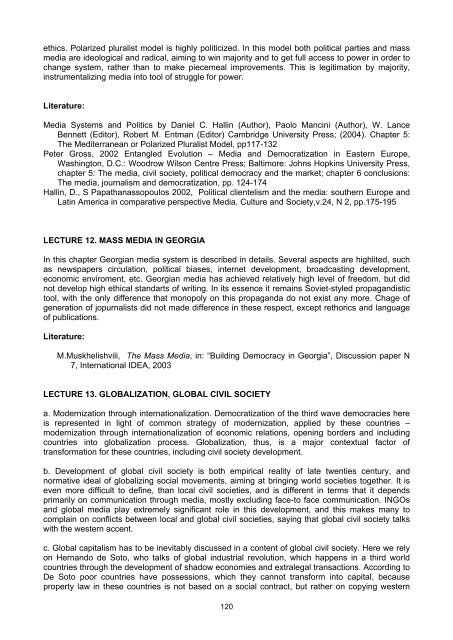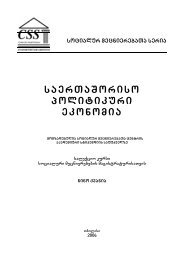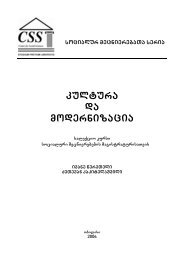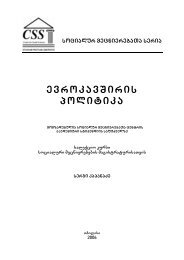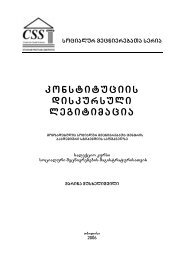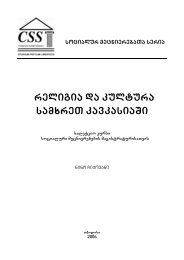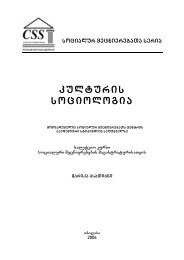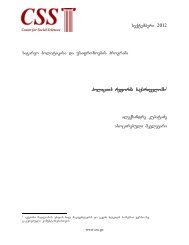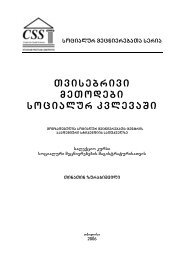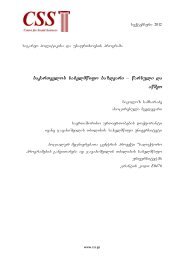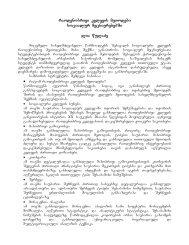samoqalaqo sazogadoeba - Center for Social Sciences
samoqalaqo sazogadoeba - Center for Social Sciences
samoqalaqo sazogadoeba - Center for Social Sciences
You also want an ePaper? Increase the reach of your titles
YUMPU automatically turns print PDFs into web optimized ePapers that Google loves.
ethics. Polarized pluralist model is highly politicized. In this model both political parties and mass<br />
media are ideological and radical, aiming to win majority and to get full access to power in order to<br />
change system, rather than to make piecemeal improvements. This is legitimation by majority,<br />
instrumentalizing media into tool of struggle <strong>for</strong> power.<br />
Literature:<br />
Media Systems and Politics by Daniel C. Hallin (Author), Paolo Mancini (Author), W. Lance<br />
Bennett (Editor), Robert M. Entman (Editor) Cambridge University Press; (2004). Chapter 5:<br />
The Mediterranean or Polarized Pluralist Model, pp117-132<br />
Peter Gross, 2002 Entangled Evolution – Media and Democratization in Eastern Europe,<br />
Washington, D.C.: Woodrow Wilson Centre Press; Baltimore: Johns Hopkins University Press,<br />
chapter 5: The media, civil society, political democracy and the market; chapter 6 conclusions:<br />
The media, journalism and democratization, pp. 124-174<br />
Hallin, D., S Papathanassopoulos 2002, Political clientelism and the media: southern Europe and<br />
Latin America in comparative perspective Media, Culture and Society,v.24, N 2, pp.175-195<br />
LECTURE 12. MASS MEDIA IN GEORGIA<br />
In this chapter Georgian media system is described in details. Several aspects are highlited, such<br />
as newspapers circulation, political biases, internet development, broadcasting development,<br />
economic enviroment, etc. Georgian media has achieved relatively high level of freedom, but did<br />
not develop high ethical standarts of writing. In its essence it remains Soviet-styled propagandistic<br />
tool, with the only difference that monopoly on this propaganda do not exist any more. Chage of<br />
generation of jopurnalists did not made difference in these respect, except rethorics and language<br />
of publications.<br />
Literature:<br />
M.Muskhelishvili, The Mass Media, in: “Building Democracy in Georgia”, Discussion paper N<br />
7, International IDEA, 2003<br />
LECTURE 13. GLOBALIZATION, GLOBAL CIVIL SOCIETY<br />
a. Modernization through internationalization. Democratization of the third wave democracies here<br />
is represented in light of common strategy of modernization, applied by these countries –<br />
modernization through internationalization of economic relations, opening borders and including<br />
countries into globalization process. Globalization, thus, is a major contextual factor of<br />
trans<strong>for</strong>mation <strong>for</strong> these countries, including civil society development.<br />
b. Development of global civil society is both empirical reality of late twenties century, and<br />
normative ideal of globalizing social movements, aiming at bringing world societies together. It is<br />
even more difficult to define, than local civil societies, and is different in terms that it depends<br />
primarily on communication through media, mostly excluding face-to face communication. INGOs<br />
and global media play extremely significant role in this development, and this makes many to<br />
complain on conflicts between local and global civil societies, saying that global civil society talks<br />
with the western accent.<br />
c. Global capitalism has to be inevitably discussed in a content of global civil society. Here we rely<br />
on Hernando de Soto, who talks of global industrial revolution, which happens in a third world<br />
countries through the development of shadow economies and extralegal transactions. According to<br />
De Soto poor countries have possessions, which they cannot trans<strong>for</strong>m into capital, because<br />
property law in these countries is not based on a social contract, but rather on copying western<br />
120


